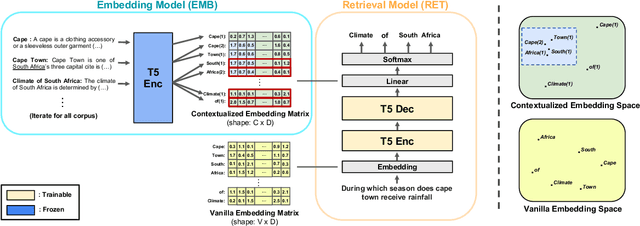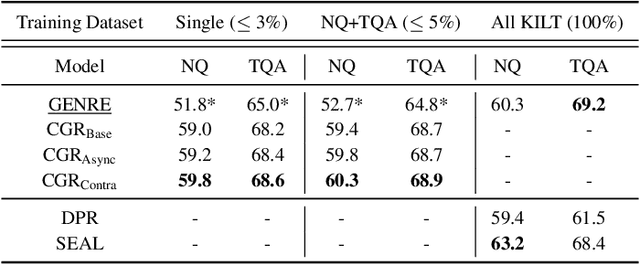Vlad Karpukhin
Arcee's MergeKit: A Toolkit for Merging Large Language Models
Mar 21, 2024Abstract:The rapid expansion of the open-source language model landscape presents an opportunity to merge the competencies of these model checkpoints by combining their parameters. Advances in transfer learning, the process of fine-tuning pretrained models for specific tasks, has resulted in the development of vast amounts of task-specific models, typically specialized in individual tasks and unable to utilize each other's strengths. Model merging facilitates the creation of multitask models without the need for additional training, offering a promising avenue for enhancing model performance and versatility. By preserving the intrinsic capabilities of the original models, model merging addresses complex challenges in AI - including the difficulties of catastrophic forgetting and multitask learning. To support this expanding area of research, we introduce MergeKit, a comprehensive, open-source library designed to facilitate the application of model merging strategies. MergeKit offers an extensible framework to efficiently merge models on any hardware, providing utility to researchers and practitioners. To date, thousands of models have been merged by the open-source community, leading to the creation of some of the worlds most powerful open-source model checkpoints, as assessed by the Open LLM Leaderboard. The library is accessible at https://github.com/arcee-ai/MergeKit.
Contextualized Generative Retrieval
Oct 07, 2022



Abstract:The text retrieval task is mainly performed in two ways: the bi-encoder approach and the generative approach. The bi-encoder approach maps the document and query embeddings to common vector space and performs a nearest neighbor search. It stably shows high performance and efficiency across different domains but has an embedding space bottleneck as it interacts in L2 or inner product space. The generative retrieval model retrieves by generating a target sequence and overcomes the embedding space bottleneck by interacting in the parametric space. However, it fails to retrieve the information it has not seen during the training process as it depends solely on the information encoded in its own model parameters. To leverage the advantages of both approaches, we propose Contextualized Generative Retrieval model, which uses contextualized embeddings (output embeddings of a language model encoder) as vocab embeddings at the decoding step of generative retrieval. The model uses information encoded in both the non-parametric space of contextualized token embeddings and the parametric space of the generative retrieval model. Our approach of generative retrieval with contextualized vocab embeddings shows higher performance than generative retrieval with only vanilla vocab embeddings in the document retrieval task, an average of 6% higher performance in KILT (NQ, TQA) and 2X higher in NQ-320k, suggesting the benefits of using contextualized embedding in generative retrieval models.
 Add to Chrome
Add to Chrome Add to Firefox
Add to Firefox Add to Edge
Add to Edge